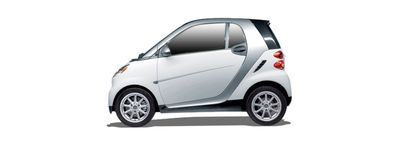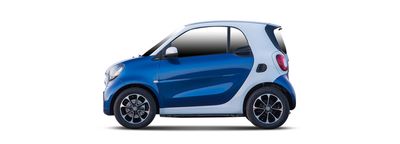Table of Contents
Smart Fortwo engines
Since its introduction in 1998, the Smart Fortwo has established itself as an urban subcompact and offers a compact but diverse Smart Fortwo engine range across four generations. From the early three-cylinder petrol engines to modern turbo engines and electric drives, the development of Smart Fortwo engines shows a continuous technical evolution.

Smart Fortwo engines: Historical generations (1998-2014)

The first two Smart Fortwo generations (1998-2007 and 2007-2014) shaped the character of the brand with their unconventional engine concepts and formed the foundation for all subsequent developments. These historic Smart Fortwo generations typically reached 150,000 to 250,000 kilometers with proper maintenance, with the second generation engines being significantly more reliable than the early units. Major engine failures were rare, but the first generations in particular suffered from problems with the automated gearshift and occasional turbocharger damage. The absolute top engine of this era was the Smart Fortwo 1.0 Turbo with 84 hp from the second generation, which optimally combined power, efficiency and reliability.
Smart Fortwo gasoline engines: Historic generations (1998-2014)
The Smart Fortwo petrol engine range of the first generation (1998-2007) was based on a 0.6-liter three-cylinder engine with 45 hp (33 kW) and later 55 hp (40 kW). Although these Smart Fortwo engines were economical, they were underpowered and prone to problems with the ignition coil and catalytic converter. From 2003, the Smart Fortwo 0.7 Turbo with 61 hp (45 kW) was added, which offered more power but occasionally suffered turbocharger damage. The second generation (2007-2014) brought more modern power units: the Smart Fortwo 1.0 MHD (Micro Hybrid Drive) with 71 hp (52 kW) developed into the most reliable petrol engine of this era, while the Smart Fortwo 1.0 Turbo with 84 hp (62 kW) was considered the most powerful engine. The Smart Fortwo Brabus with 102 hp (75 kW) rounded off the top end of the range, but was susceptible to turbocharger damage when driven in a sporty manner.
Smart Fortwo diesel engines: Historic generations (1998-2014)
The Smart Fortwo CDI was a specialty in the subcompact segment and offered exceptional fuel economy. The first generation (1999-2007) had a 0.8-liter three-cylinder diesel with 41 hp (30 kW), which consumed only 3.4 liters per 100 km despite its low output. The second generation (2007-2014) received a more modern 0.8 CDI with 54 hp (40 kW), which offered common-rail injection and a particulate filter. These Smart Fortwo diesels proved to be extremely durable and economical, but suffered from high maintenance costs and occasional problems with the particulate filter in the city.
| Smart Fortwo engine | Power output | Fuel consumption | Typical weaknesses | Rating |
|---|---|---|---|---|
| 0.6 gasoline | 45-55 HP | 5.3-5.8 l/100km | Ignition coil, catalytic converter | Average |
| 0.7 Turbo | 61 HP | 5.9 l/100km | Turbocharger damage | Moderate |
| 1.0 MHD | 71 HP | 4.7 l/100km | Very robust | Very good |
| 1.0 Turbo | 84 HP | 5.1 l/100km | Occasional turbocharger | Good |
| Brabus | 102 HP | 5.8 l/100km | Turbocharger damage | Moderate |
| 0.8 CDI | 41-54 HP | 3.1-3.4 l/100km | Particle filter, maintenance costs | Good |

Smart Fortwo engines: Generation III (2014-2019)

The third Smart Fortwo generation marked a new beginning with completely new engines and improved reliability. This generation easily reached 200,000 to 300,000 kilometers with proper maintenance, whereby the atmospheric engines were considered to be particularly durable. Major engine damage became a rarity, with only the turbo variants continuing to show occasional weaknesses. The absolute highlight was the Smart Fortwo 1.0 with 71 hp - a technically mature three-cylinder engine without turbocharging, which optimally combined reliability and efficiency. A purely electric version (smart EQ fortwo) was also introduced for the first time, revolutionizing the engine portfolio.
Smart Fortwo petrol engines: Generation III (2014-2019)
The Smart Fortwo petrol engine range comprised two basic engines: the 1.0-liter three-cylinder with 71 hp (52 kW) and the 0.9-liter turbo with 90 hp (66 kW). The Smart Fortwo 1.0 proved to be the most reliable engine of this generation - without turbocharging, it remained free of the typical turbocharger problems and offered smooth power delivery. The Smart Fortwo 0.9 Turbo offered more power, but was more susceptible to turbocharger damage and increased oil consumption. For sporty drivers, there was the Smart Fortwo Brabus with 109 hp (80 kW), which, however, was considered the most problematic engine of this generation - frequent reports of turbocharger damage and overheating during sporty driving made it the problem child of the series.
Smart Fortwo electric drive: Generation III (2014-2019)
The smart EQ fortwo with 82 hp (60 kW) of electric power revolutionized the concept of the city car. With a range of up to 160 km and virtually maintenance-free operation, this drive system quickly became a favorite for city drivers. The battery technology proved to be reliable, only the charging times of up to 6 hours at the household socket were criticized.
| Smart Fortwo engine | Power output | Fuel consumption | Typical weaknesses | Rating |
|---|---|---|---|---|
| 1.0 Petrol | 71 HP | 4.1 l/100km | Very robust, no turbocharging | Very good |
| 0.9 Turbo | 90 HP | 4.7 l/100km | Turbocharger damage, oil consumption | Moderate |
| Brabus | 109 HP | 5.2 l/100km | Turbocharger damage, overheating | Problematic |
| EQ Electric | 82 HP | 16.3 kWh/100km | Long charging times | Good |

Smart Fortwo engines: Generation IV (2019-2024)
The fourth Smart Fortwo generation focused entirely on electromobility and marked the end of combustion engines at smart. As a pure electric vehicle, the smart EQ fortwo offered various performance levels and marked the transition to the all-electric future of the brand. The reliability of the electric drives proved to be outstanding, with expected mileages of over 300,000 kilometers and minimal maintenance costs. The top-of-the-range engine was the smart EQ fortwo with 82 hp, which offered the perfect balance between performance, range and efficiency. The battery technology was continuously improved and offered a range of up to 180 km at the end of the production period.
Smart Fortwo electric drive: Generation IV (2019-2024)
The smart EQ fortwo was offered exclusively as an electric vehicle and had an 82 hp (60 kW) electric motor with 160 Nm of torque. The 17.6 kWh battery enabled a range of 130-180 km depending on the equipment and driving style. The Smart Fortwo electric drive proved to be extremely reliable and low-maintenance - typical combustion engine problems were a thing of the past. Only the charging infrastructure and the limited range for long distances were identified as weaknesses. The battery could be charged to 80% in 40 minutes at the fast charging station.
| Smart Fortwo engine | Power output | Fuel consumption | Typical weaknesses | Rating |
|---|---|---|---|---|
| EQ Electric | 82 HP | 16.1 kWh/100km | Limited range | Very good |

Smart Fortwo engines: Generation V (2024-today)
The current Smart Fortwo Generation #1 represents a complete reinvention of the brand under Chinese-German leadership and relies entirely on modern electric technology. With significantly larger dimensions and state-of-the-art battery technology, the new Smart Fortwo offers a range of up to 440 km. As the generation has only been on the market since 2024, there is no long-term experience yet, but the first tests show promising approaches. The top-of-the-range engine is the smart #1 Brabus with 428 hp, which combines sporty performance with high efficiency. The new battery technology promises a service life of over 500,000 kilometers with minimal maintenance costs.
Smart Fortwo electric drive: Generation V (2024-today)
The smart #1 engine range includes various electric drives from 272 hp to 428 hp system output. The smart #1 with 272 hp (200 kW) forms the basis and offers a range of up to 440 km. The smart #1 Brabus with 428 hp (315 kW) is developing into the most powerful smart of all time and offers sports car performance with SUV practicality. All new-generation Smart Fortwo engines feature 800-volt technology and can be charged from 10% to 80% in 30 minutes.
| Smart Fortwo engine | Power output | Fuel consumption | Typical weaknesses | Rating |
|---|---|---|---|---|
| 1 Electric | 272 HP | 17.9 kWh/100km | No long-term experience yet | Very good |
| 1 Brabus | 428 HP | 18.7 kWh/100km | High price, complex technology | Good |

Conclusion: The best Smart Fortwo engines of all generations
The development of Smart Fortwo engines shows a fascinating transformation from unconventional combustion engines to state-of-the-art electric technology. While the early Smart Fortwo generations still struggled with teething troubles, the later electric drives developed into extremely reliable and efficient solutions for urban mobility. The new generation #1 promises a further increase in performance and range.
- Best Smart Fortwo gasoline engine:
The Smart Fortwo 1.0 MHD (71 hp, Generation II & III) combines high reliability with low fuel consumption and dispenses with problematic turbocharging.
- Best Smart Fortwo diesel engine:
The Smart Fortwo 0.8 CDI (54 hp, Generation II) offers exceptional economy with just 3.1 liters of fuel consumption and high durability.
- Best Smart Fortwo electric drive:
The smart EQ fortwo (82 hp, Generation III & IV) with its balanced combination of performance, range and reliability with minimal maintenance costs.
For maintenance and spare parts for all Smart Fortwo generations, AUTODOC offers a comprehensive range of original and quality spare parts with fast delivery and expert advice.
TOP Products on the topic:















